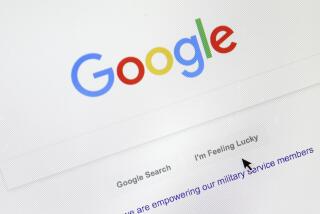On PINs and Needles
Back in the ‘60s, life was as easy as 1-2-3.
The only number I had to remember was my telephone number.
Today, our heads must store multiple and ever-changing strings of digits to access everything from computers to cash. Forget them and your entire world seizes.
At last count I had 22 personal identification numbers (PINs), passwords, log-ons and identification codes to manage. There are five for computer systems, four for telephone credit cards, three for voice-mail systems, one for phone banking, four for credit card advances, three for ATM cards and two to access home telephone answering machines remotely.
And to make matters worse, I can’t even write these numbers down, lest some crook break and enter my life.
I tried to make things more manageable by using the same four digits for everything. But that didn’t work for half the things I need to access, as high-security computer systems require regular changing of passwords, some institutions don’t allow you to choose your own codes and sometimes my standard code doesn’t mesh with an institution’s parameters.
And even for the places that do accept my own secret code--which is a variation on my two lucky numbers--I have to remember which places they are.
Amazingly, for the most part things have gone all right. Still, the whole password thing creates constant stress. Every time we go to access something, our brains go into memory search overdrive.
Helen Irlen, a Long Beach learning disabilities expert, assures us that this is all perfectly normal. Even she feels overwhelmed trying to retain access codes.
“Numbers are non-meaningful sequential information and lots of people have difficulty with them,” she says. “But people don’t complain because they think everyone else can do it. They’re just not aware other people are having similar problems.”
Irlen, who says she has put off making overseas phone calls because she cannot remember the access codes, bemoans today’s society.
“Instead of connecting more with words and people, we’re connecting more with numbers and machines. People feel more and more depersonalized.”
John Hall, a spokesman for the Washington, D.C.-based American Bankers Assn., says all this technology started in 1971, when a bank in Atlanta gave out the country’s first PIN.
“It took about 10 years for consumers to really catch on, but now you can’t imagine not being able to get cash on a Sunday,” he says, adding that in 1995, there were 211 million ATM cards and 439.8 million credit cards in use.
How often do people forget their PINs?
Oh, to have a penny for every time. . . .
“And what people don’t realize is that if they forget their ATM number and keep trying to punch in guesses, after two or three times, the machine might eat their card.”
My roommate, Mark Podlaseck, 39, a creative director at IBM, has more than a dozen codes to remember, including six alphanumeric computer passwords that must be changed every 30 to 90 days.
Whenever possible, he uses a loved one’s birthday, a date he won’t forget. For everything else, he uses the title of whatever book he’s reading at the time.
This strategy worked well until he used the title of a book he had stopped reading after the first chapter because it was so boring.
“Usually I’ll spend a month with a book,” he says. “But I ended up hating this one and started a new one, completely forgetting I’d changed four passwords to the other one”--and completely forgetting the title of the dreadful book.
The result: He was locked out of his company’s mainframe for 48 hours and missed notification of an important meeting he was supposed to attend.
“I didn’t get fired,” he says, “but I missed the announcement of my promotion.”
Kevin Slavin, owner of a graphics design studio in Manhattan, remembers his various passwords by looking at a telephone keypad and translating code numbers into words.
Slavin, 27, says this worked fine until one night two years ago he found himself penniless in Berlin, where he trekked to a credit card cash advance machine only to find there were no letters on the keypad. Worse yet, the numbers were in a different arrangement, so he couldn’t even remember the familiar motion of punching in the code.
“I got cash from the bank the next morning, but I didn’t eat that night,” he says. “I’ve memorized the American keypad so it can never happen again.”
And then there’s Phil Berent, 38, president of an international capital management company based in New York City. He’s never had trouble remembering number sequences--as long as he knows he has sequences to remember, which brings us to his Internet provider.
“They give passwords that are automatically assigned and put into the bowels of your computer by their computer when you sign up,” Berent says. “I never even saw mine.”
One day, a glitch on the provider’s end prevented his access to the Net. He called only to be told he had to reenter his password himself, as the provider had no record of it.
“They acted as if I was stupid for not having it written down somewhere,” he recalls.
Berent says it took three days to set up a new account--only then was he told that all e-mail sent to the old address was forever lost. It took him another three days to notify all his clients and figure out what communications he’d missed.
“It was,” he says, “disastrous.”






